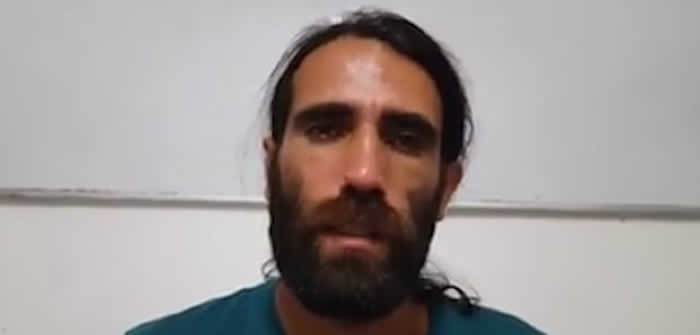Iranian refugee Behrouz Boochani, who has been detained on Manus Island for four years, has asked for a visa to the UK after his film shot within Australia’s offshore detention regime was accepted to play at the London film festival next month.
Boochani is co-director of the film Chauka, Please Tell us the Time, which debuted at the Sydney film festival in June to widespread acclaim.
The film was produced in collaboration with Iranian-Dutch film-maker Arash Kamali Sarvestani, who took footage secretly shot by Boochani on camera phone within the detention centre to create a full-length feature narrative.
The name is inspired by the Chauka bird, a honeyeater indigenous to Manus Island, which is also an unofficial timekeeper on the island, making a distinctive call at the beginning and end of the day.
But the name was also used for the solitary confinement cell of Manus detention centre, where refugees and asylum seekers were taken for “noncompliance” and reportedly beaten and tortured.
Boochani told the Guardian it was his right as a director to see his film shown to audiences.
“This movie is not only for me and Arash, this movie is for 2,000 children, women and men who are forgotten for more than four years. It’s very important that I be there and have this opportunity to talk directly with the audience.
“It’s my right to be there: only dictatorships are scared of artists.”
Boochani said he thought Australia would prevent any efforts to allow him to travel to London. “I think the UK will give me a visa because people in London know me as a director, but I don’t think Australia will let me to go because Australia knows me as an enemy.”
From inside the Australian-run Manus detention centre Boochani has written to Menna Rawlings, the UK high commissioner to Australia, asking for a visa so he can attend the premiere of his film at the London film festival on 8 October.
The same letter was also sent to Sadiq Khan, the London mayor. It says:
My name is Behrouz Boochani. I’m writing this letter from Manus prison camp which is run by the Australian government in Papua New Guinea. I’m writing in regards to the 61st London international film festival. I am a film director and my movie Chauka, Please Tell us the Time (made with co-director Arash Kamil Sarvestani) has been accepted for the festival. It will screen on the 8 and 9 October. This is a great honour for any director and I would like to attend the festival.
I am asking you to give me visa. I have been here in this prison camp for more than four years, even though I have committed no crime, and I am kept here by the Australian government who exiled me by force.
The chief executive of the Media Entertainment and Arts Alliance, Paul Murphy, has also written to Rawlings in support of Boochani.
“As the union for Australian journalists, writers, actors and film crew workers, the MEAA can vouch that Mr Boochani is a respected journalist.
“Your excellency, we believe it would convey a strong gesture in support of human rights to allow Mr Boochani to travel to London, and urge you to use your influence as British high commissioner to Australia to assist in granting him a temporary visa.”
A spokeswoman for the British High Commission told the Guardian: “We do not routinely comment on individual visa cases. All UK visa applications are decided by UK Visas & Immigration.”
When Chauka was accepted to screen at the Sydney film festival, Boochani requested a visa to Australia.
An anonymous Department of Immigration and Border Protection official, who gave only their position number, rejected his application. “You are not eligible to travel to Australia … your travel does not satisfy the conditions.”
Boochani, an ethnic Kurd from western Iran, was a journalist in his home country before he was forced to flee after being targeted and arrested by Iran’s Sepah, known formally as the Army of the Guardians of the Islamic Revolution. He arrived in Australia by boat and was transferred to Manus in August 2013.
His documentary was filmed inside the Manus detention centre over the course of months, shot entirely on a mobile phone kept hidden from authorities by Boochani.
Boochani and Sarvestani collaborated by distance: Boochani filming short clips and sending them via WhatsApp – and Manus’s sclerotic internet – to Sarvestani, who built the narrative of Chauka piece by piece.
Boochani has been held on PNG for four years, without charge or trial. He has been granted refugee status: that is he has a well-founded fear of persecution in his homeland, and is legally owed protection. He cannot be returned to Iran.
The Manus Island detention centre, and Australia’s other offshore camp on the Pacific island of Nauru, were both reopened in 2012 and have been plagued by allegations of violence, including murder; sexual predation of men, women and, in particular, children; medical neglect leading to death; high rates of suicide and self-harm; and other human rights abuses.
The Australian government has announced it will close the Manus camp on 31 October, and refugees forced to resettle in PNG or abandon their protection claim and return home. Some refugees might be accepted for resettlement in the US but, 10 months after the US-Australia refugee swap deal was announced, no one has yet been accepted.
Source: The Guardian

